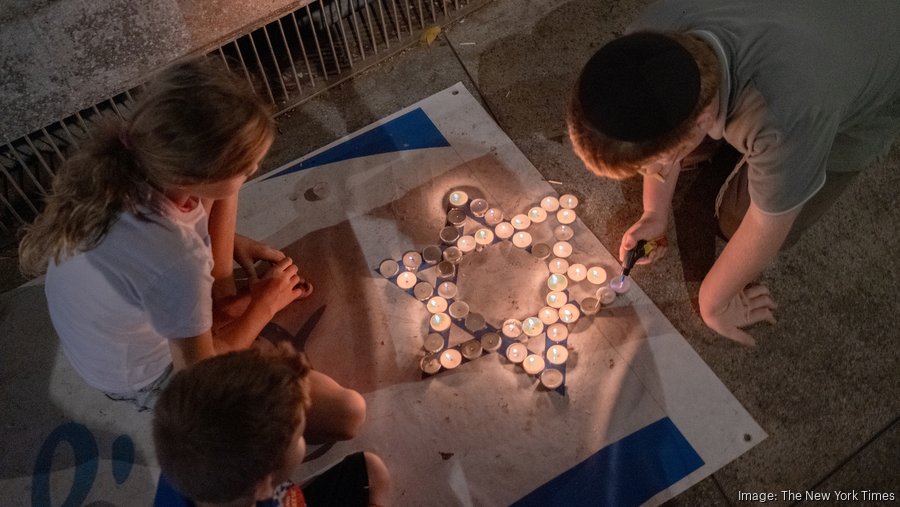Listen to this article 2 min
David Gitlin was attending a business meeting in Prague, Czech Republic, when he got word of the Oct. 7 Hamas terror attack on Israel that left 1,400 people dead and thousands more injured.
It did not take long for Gitlin, a partner at Conshohocken-based Royer Cooper Cohen Braunfeld and head of the law firm's Israel practice, to receive terrible news from a client. A senior executive for an Israeli industrial firm was killed along with his wife and four children on the kibbutz where they lived in southern Israel when Hamas gunmen went on a door-to-door killing spree.
Gitlin and his colleagues swung into action, providing personal and professional assistance to the company.
“We were in the middle of a transaction for that company so I thought that transaction was going to be dead in the water,” Gitlin said. “But, surprisingly, I was told that they would like to continue pursuing it after some time of regrouping."
Gitlin spoke with lawyers on the other side of the deal and was granted more time to complete the company's transaction, which he hopes will close in the near future.
As businesses in Israel face major challenges during this difficult time, Gitlin and his colleagues from Royer Cooper have been trying to assist with securing financing, helping those displaced or who lost loved ones, and filling business gaps left by the 360,000 Israelis called up to the armed forces reserves.
Since the terror attack, Gitlin said he has spent half of his days on the phone with clients, family and friends in Israel.

Royer Cooper partner Roger Braunfeld and Executive Partner Neil Cooper are also heavily involved in the firm’s Israel practice. The firm, which has more than 60 lawyers, represents several Philadelphia-area companies that are either investing in or buying Israeli companies. But the bulk of its activities are focused on representing Israeli companies in establishing U.S. operations, obtaining financing from U.S. investors, or acquiring or selling to U.S. companies.
Braunfeld said the terror attack has called for a unique type of assistance to Israeli clients and their families.
“You can imagine if there's a business, chances are either the CEO is getting called up to the reserves or their spouse is getting called up,” he said. “I have one client that has three kids, one six-month-old, and both parents worked and now one of them's been called up. You can imagine, when you hear, you help them in any way you can.”
Gitlin, who lived in the Jewish state as a young man in the 1970s and still spends two months there each year, has been surprised at how Israeli businesses have continued operating without interruption in spite of the massive grief, the constant shelling from Hamas rockets and a pending ground invasion in Gaza. Israel has begun to bombard the northern part of the Gaza Strip with air attacks on Hamas targets while warning civilians there to flee to the south to avoid being injured in what will almost certainly be a prolonged ground war.
“I'm still getting kind of routine stuff that I thought would be put aside,” Gitlin said. “We've been actively working in various ways on assisting individuals and companies. Some of them are legal and some need supplies or help with relocating or taking care of their families.”

Braunfeld and Gitlin said one of the main things that they can do for their Israeli clients is to connect them with their network of largely Jewish American clients who want to provide financial assistance to Israeli companies and individuals.
Cooper had been scheduled to visit Israel with a group of local businesspeople this coming weekend, including a visit to the southern Israel region that was hit hardest by the attack. While that trip has been canceled, Cooper and Gitlin said the Philadelphia business community is still trying to help residents of that area with relocation, rebuilding communities and assisting with physical injuries.
“We've reached out to a number of people who have connections with that area,” Gitlin said. “And we’ve identified a number of organizations and fundraising initiatives, which are directly related to supporting those kids in those communities in the border [to Gaza] who were most affected.”
Despite the fact that air raid sirens and rocket fire can be commonplace in Israel, Gitlin said he has never seen a business meeting canceled due to missiles raining down on Israeli cities such a Tel Aviv during past military conflicts. He said that could change if Hezbollah, the Iranian-backed terrorist group situated in Lebanon, enters the fray, because they have more precise missiles and a larger number of them.
Since the Hamas attack, Hezbollah has reportedly been firing rockets at Israeli Defense Force posts in Israel, leaving Israelis and Americans concerned about the prospect of a two-front war. Both Hamas and Hezbollah are financially supported by Iran, which does not recognize Israel's right to exist. Hezbollah is allowed to operate freely in Lebanon and has engaged in several military conflicts with Israel over the years.
“I have family and friends and clients in Tel Aviv who are not bothered by the missiles,” Gitlin said. “They're bothered by what's going to happen in Gaza. And the potential escalation in the north [with Hezbollah]. Many of them have children in front units.”
Gitlin said when key employees from clients get called to fight in the Israeli armed forces, his team can try and fill voids to make sure business is still conducted.
“Of course they are severely impacted,” Gitlin said. “But my experience is that they're basically saying, 'Well, we're doing the best we can. It may take us longer to get to the goal we wanted, but we get there.’”

Cooper said he and Braunfeld also have extensive contacts, friends and family in Israel. While Cooper declined to say what percentage of the firm’s annual revenue is generated by its Israel practice, he noted that it has dozens of Israeli clients.
There are not many U.S. law firms with Israeli offices as American lawyers who are not members of the Israeli bar cannot practice law in that country and U.S. firms cannot share revenue with Israeli firms. Royer Cooper does not have an office in Israel but several of its lawyers spend a significant amount of time there. Both Gitlin and Cooper are past presidents of the Philadelphia-Israel Chamber of Commerce and Gitlin is a fluent Hebrew speaker who is intimately familiar with the country’s culture.
“It's a small country, so clients refer other clients,” Gitlin said. “We really don't do any PR or advertising. It's mostly word of mouth.”





